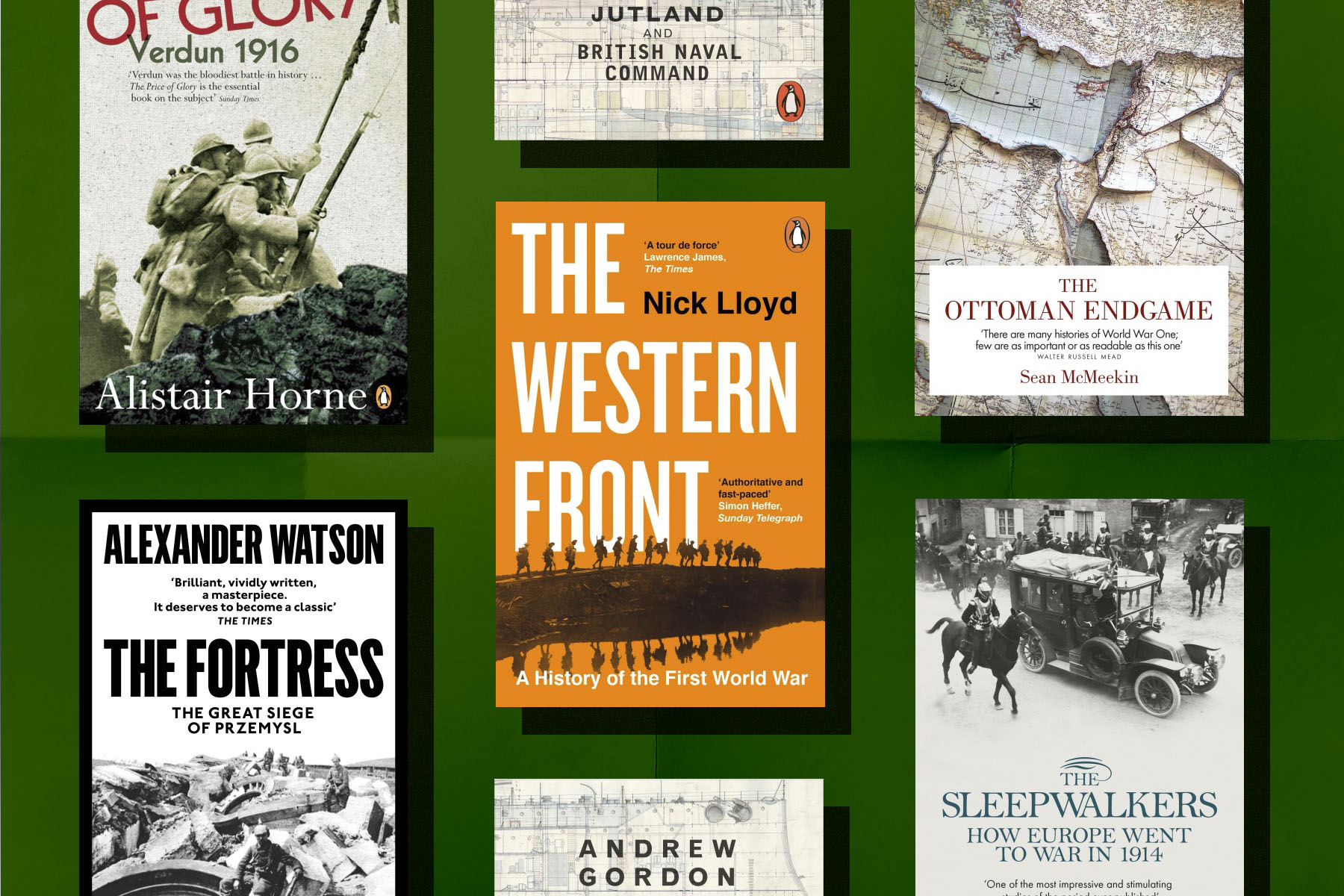- Home |
- Search Results |
- The greatest books ever written about the First World War
The greatest books ever written about the First World War
From country-specific accounts of WWI to deeply researched non-fiction about the trenches, this book list by modern warfare professor Nick Lloyd transcends mere dates and facts and delves into the global effects and aftermath of the supposed ‘war to end all wars’.

Known at the time as The Great War, and shortly “the war to end all wars”, the First World War was one of the deadliest conflicts in history, resulting in over 20 million soldier and civilians died worldwide, and in the process reshaping the political, cultural, economic, and social facts of the newly global world.
Despite the sheer amount written about the war – and the fact that it now happened a full century ago – scholars continue to this day to unearth new facts, figures and theories about the war, its lead-up and aftermath, and the roles that soldiers, generals and civilians all played, in new and fascinating books and essays.
In his new book The Western Front, for example, author and Professor of Modern Warfare at King’s College London Nick Lloyd does just that, integrating deep, well-research scholarship (including overlooked first-person accounts and archival material) with careful analysis and compelling readability to redefine our perception of the First World War from one of “mud, blood and futility” to one that harboured unprecedented innovation.
Here, we asked Nick to use his expertise to round up a selection of the very best non-fiction on the subject, to satisfy newbies and world war buffs alike.
The Guns of August by Barbara Tuchman (1962)
Tuchman’s survey of the opening month of the war, particularly its nerve-shredding account of the German march through Belgium and France, remains as fresh today as when it was first written in 1962. It places the reader squarely alongside the generals and their footsore, exhausted soldiers as they geared up to fight the First Battle of the Marne. A classic of narrative history.
A Mad Catastrophe: The Outbreak of World War I and the Collapse of the Habsburg Empire by Geoffrey Wawro (2014)
Geoffrey Wawro’s explosive study of the Austro-Hungarian Empire and its road to the “mad catastrophe” of 1914 became an instant classic when it was published for the centenary. Delving into the “dark heart” of Vienna, Wawro shows how it goaded Serbia and Russia into war, before tracing the wavering fortunes of the Royal and Imperial Army as it faced off against two strong opponents and, ultimately, nearly collapsed after just three months of fighting.
The White War: Life and Death on the Italian Front, 1915-1919 by Mark Thompson (2009)
A stunning, lyrical portrait of the Italian Front. Mark Thompson’s White War offers an unrivalled insight into the oft-forgotten war in north-east Italy that took place in some of the most inhospitable and difficult locations in the history of warfare. Full of memorable characters, from the ruthless General Luigi Cadorna and Ernest Hemingway to the proto-fascist Gabriele D’Annunzio, this account shows us what happened when Italy joined the First World War and fought so hard for a victory that was, in the end, a “mutilated” one that would poison her body politic for generations.
The First World War, Volume One: To Arms by Hew Strachan (2001)
The first volume of a planned trilogy on the history of the First World War, Strachan’s To Arms is a monumental work of scholarship and synthesis. Covering (amongst other things) the origins of the war, the fighting in 1914, and the conflict in Africa, this account is based upon an enormous range of sources from multiple languages and spans almost 1,200 pages of text. A stimulating and engrossing, albeit unfinished work.
Paris 1919: Six Months That Changed the World by Margaret MacMillan (2001)
Although not strictly about the war itself, Margaret MacMillan’s stirring study of the conference at Versailles in 1919, originally titled Peacemakers, is an essential read. Vivid portraits of President Wilson, Prime Minister Lloyd George, and French Prime Minister Georges Clemenceau are at the heart of his detailed narrative about how the “war to end all wars” was brought to a fitting conclusion. Importantly, she does not subscribe to the simplistic myth of the “Carthaginian peace” at Versailles that has become so central to popular memory, and offers a challenging reassessment of an ultimately flawed piece of diplomatic and political manoeuvring.
Black Poppies: Britain’s Black Community and the Great War by Stephen Bourne (2014)
The First World War happened at the same time that social Darwinian concepts like racial purity were in ascendancy. Yet, both Britain and France relied heavily on assistance from Black soldiers: the French sent out Tukulor, Wolof, Serer and Bambara forces under the impression that they would be more “naturally warlike”, while the British sent out Caribbean Brits (not to mention Indian troops); their services went largely unacknowledged, and they returned (if they did) to racism as deeply entrenched as it was before the war. Hailed by author Bernardine Evaristo as “a powerful, revelatory counterbalance to the whitewashing of British history”, Black Poppies is a must-read.